Edie Melson's Blog, page 60
February 23, 2024
Crafting Compelling Stories: A Hollywood Formula for Success

by Zena Dell Lowe @ZenaDellLowe
Unlocking the Secrets of a Blockbuster Story
As writers, the dream of Hollywood recognition often feels like an elusive fantasy, reserved for the lucky few. Still, most of us can’t help but to wonder about it, and we certainly understand why it should matter to novelists.
Hollywood's love for adapting books into movies is the key. By turning a successful book into a film, they tap into a pre-existing audience, reducing the risk of failure. Your published book signals viability and an existing fan base, making it desirable for adaptation. Think J.K. Rowling, who not only made a fortune from her books but also laughed all the way to the bank with the movie adaptations.
Now, making money shouldn't be the sole motivation for writing, but dreaming big and testing your story against Hollywood's standards can undoubtedly elevate your craft. The question is, in a saturated market, how can novelists hope to get the attention from Hollywood that they seek?
The good news is, it might not be as difficult as you think.
Today, I want to encourage you on your quest to make your story not just good, but Hollywood-worthy. We’ll dive into a formula—Heart, Smarts, and Sparkle—that helps Hollywood assess the potential of your story. By tapping into this formula, you give yourself a much greater chance to get noticed.
Heart, Smarts, and Sparkle – The New Lingo
In the old days of story evaluation, Aristotle identified three key ingredients that every great story must have. He called these Logos, Pathos, and Ethos. We’re just updating the terms to give them a Hollywoodized shine, but the basic ingredients remain the same.
Heart: Forging an Unbreakable Connection
The heart of any story lies in the emotional connection it forges with the audience through the main character. Regardless of whether your character is likable, sympathetic, or intriguing, this emotional bond is non-negotiable. Unless your audience emotionally commits to your character's journey, there is no story. The key of any story is a compelling main character. You must create one that the audiences is willing to invest in, and that’s the heart connection you need to succeed.
Smarts: Unveiling Originality and Insight
Smarts, the second element of our formula, comes in two flavors: arena and insight. The smartness of your story lies in showcasing a world or perspective that's fresh and original. Avoid clichés, offer new insights, take the audience to a world they’ve never seen before, and build themes that resonate. Whether it's through the setting, like the fish market down the street, or profound themes, smartness ensures your story stands out.
Sparkle: The Elusive Magic Touch
The third and arguably most critical component is Sparkle—the extra magic that bedazzles your story. While it might be the trickiest to control, your story must possess it. Johnny Depp's performance as Jack Sparrow was the sparkle in Pirates of the Caribbean. Otherwise, it would have been a conventional pirate movie. Unfortunately, the writer had no control over that, but M. Night Shyamalan had control over it when he wrote the twist ending of The Sixth Sense. J.K. Rowling's magical world in Harry Potter showcases not only how the extra magic can elevate a story, but also how it can be cultivated by the writer if they have the right story to tell.
While you may not be able to entirely control it, cultivating great characters and originality increases the chances of discovering that indescribable sparkle. Sparkle often emerges unexpectedly, but by focusing on creating a great character and infusing originality, you set the stage for that enchanting quality.
Final Thoughts: Testing Your Story for Hollywood
The question is: Is your story good before Hollywood? This formula, Heart, Smarts, and Sparkle, provides a lens through which to assess your story's potential. Keep in mind that building a Hollywood-worthy story is a step-by-step process. This is just one layer of many for you to evaluate. If you can identify these three things in your current WIP, you may be well on your way to crafting a compelling narrative that Hollywood will enjoy.
For more insights into the world of Hollywood, sign up for my new online course, Hollywood Story Structure Made Easy! Become an early adopter today and learn everything you need to know to write a best-selling novel. Go to https://www.thestorytellersmission.com/story-structure-made-easy to learn more.
TWEETABLECrafting Compelling Stories: A Hollywood Formula for Success from @ZenaDellLowe on @EdieMelson (Click to Tweet)
 Zena has worked professionally in the entertainment industry for over 20 years as a writer, producer, director, actress, and story consultant. Zena also teaches advanced classes on writing all over the country. As a writer, Zena has won numerous awards for her work. She also has several feature film projects in development through her independent production company, Mission Ranch Films. In addition to her work as a filmmaker, Zena launched The Storyteller’s Mission with Zena Dell Lowe, a podcast designed to serve the whole artist, not just focus on craft. In 2021, Zena launched The Storyteller’s Mission Online Platform, where she offers advanced classes and other key services to writers. Zena loves story and loves to support storytellers. Her passion is to equip artists of all levels to achieve excellence at their craft, so that they will truly have everything they need to change the world for the better through story.
Zena has worked professionally in the entertainment industry for over 20 years as a writer, producer, director, actress, and story consultant. Zena also teaches advanced classes on writing all over the country. As a writer, Zena has won numerous awards for her work. She also has several feature film projects in development through her independent production company, Mission Ranch Films. In addition to her work as a filmmaker, Zena launched The Storyteller’s Mission with Zena Dell Lowe, a podcast designed to serve the whole artist, not just focus on craft. In 2021, Zena launched The Storyteller’s Mission Online Platform, where she offers advanced classes and other key services to writers. Zena loves story and loves to support storytellers. Her passion is to equip artists of all levels to achieve excellence at their craft, so that they will truly have everything they need to change the world for the better through story.To find out more about Zena or her current courses and projects, check out her websites at WWW.MISSIONRANCHFILMS.COM and WWW.THESTORYTELLERSMISSION.COM
Published on February 23, 2024 22:00
February 22, 2024
Don’t Forget These 7 Unusual Must-Pack Items for Your Next Writing Conference

by Lori Hatcher
Conference season has begun! Ever wish you could peer over your favorite writing professional’s shoulder as he or she packs their suitcase for a conference? Wish no more.
Since stalking is illegal, I surveyed a few conference veterans to compile a collection of “Must-Pack Items.” You won’t see these on the usual list. You may not even realize you need them, but, trust me, you’ll be glad you packed them.
7 Unusual Must-Pack Items You Might Not Think Of Power Strip with Extension Cord
I can’t count how many times I’ve gone to charge my phone (which I uses as my clock and alarm) and my watch beside the bed in a hotel and discovered only one outlet. And one plug is always occupied by a lamp cord. To charge everything, I have to plug my devices into the next-closest outlet halfway across the room. Not helpful when I want to check the time in the middle of the night. My handy dandy power strip with extension cord provides eight outlets, four USB charging ports (think phone and watch), and a five-foot extension cord. Plenty of space and power to supply everything I need.
Pashmina Wrap
Conferences are notoriously cold, but who wants to lug around a coat or jacket? Years ago, I discovered pashminas—soft, cozy, elegant wraps that come in a variety of colors. They fold flat or roll up to tuck into a carryon or backpack. Choose navy or black to match every outfit, and you’ll never be cold again.
Ferrero Roche chocolate
Whether you use it to make friends, sweeten up agents and editors, or thank your instructors, premium chocolate is a must-pack for every conference. And if the conference isn’t going well? Unwrap one (or more) of these golden beauties for comfort and consolation.
Laundry Bag
No matter how long the conference lasts, you’ll be bringing back dirty clothes. I prefer to keep my clean clothes separate from my dirty ones in my suitcase. A lightweight laundry bag does the trick. And when I return home? No sorting or separating. I grab the bag and drop it in the laundry room.
Suction Cup Toothbrush Holder
I love this toothbrush cover. Not only does it keep my toothbrush dry and clean, it has a suction cup that sticks to the bathroom mirror. When I dash back to the room for a quick freshen up between appointments, I don’t have to fumble through my makeup case to find my toothbrush.
Ear plugs
I hate to say this, but even the best roommates snore sometimes. I mean, we’re tired after a long day of learning and networking. But if your roommate is snoring, you’re not sleeping, unless you tucked a super-comfortable pair of silicone ear plugs into your suitcase. I’ve only had to use mine once, but boy, was I glad I had ‘em.
Apple AirTag
True confession time. I don’t know how many times I’ve left my backpack or rolling suitcase behind in a classroom, dining hall, or auditorium. I start talking with a new writing friend and off I go, leaving my possessions behind. One Christmas, my kids gave me an Apple AirTag to keep track of my suitcase when I travel. After I arrive at a conference, I transfer it to my backpack or rolling suitcase and never again wonder where I left my stuff. About the size of a quarter, this little lifesaver pairs with my Apple phone or watch and tells me exactly where my bag is. Best $24 you’ll ever spend. And for four dollars more, you can buy a clipcase to attach it to the inside of your bag for safekeeping.()As you prepare to gather with writing friends, meet with industry professionals, and polish your craft, be sure to pack smart. With a little thought and preparation, you’ll have everything you need to experience the best conference ever.
TWEETABLEDon’t Forget These 7 Unusual Must-Pack Items for Your Next Writing Conference from Lori Hatcher on @EdieMelson (Click to Tweet)
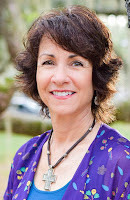 Lori Hatcher loves to inspire and equip others by sharing high-impact stories for spiritual transformation. A popular women’s ministry speaker and writing/speaking instructor, Lori is an Advanced Communicator Gold and Advanced Leader Bronze with Toastmasters International. She writes for Our Daily Bread, Guideposts, Revive Our Hearts, and Crosswalk.com. Check out her latest devotional, A WORD FOR YOUR DAY: 66 DEVOTIONS TO REFRESH YOUR MIND, from Our Daily Bread Publishing. Connect with her at LORIHATCHER.COM or on FACEBOOK.
Lori Hatcher loves to inspire and equip others by sharing high-impact stories for spiritual transformation. A popular women’s ministry speaker and writing/speaking instructor, Lori is an Advanced Communicator Gold and Advanced Leader Bronze with Toastmasters International. She writes for Our Daily Bread, Guideposts, Revive Our Hearts, and Crosswalk.com. Check out her latest devotional, A WORD FOR YOUR DAY: 66 DEVOTIONS TO REFRESH YOUR MIND, from Our Daily Bread Publishing. Connect with her at LORIHATCHER.COM or on FACEBOOK.
Published on February 22, 2024 22:00
February 21, 2024
Writing Through the Struggle
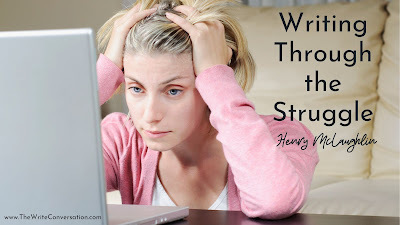
by Henry McLaughlin @RiverBendSagas
There are times when writing is hard or at least seems harder than it should be. Ideas don’t come. Or the ideas do come, but the words to flesh them into coherency flutter away like a butterfly in a swift breeze. You reach for the words, and they’re gone.
Then an idea comes, and the words start to flow. And we freeze because the words trigger memories and the memories trigger pain. Pain we thought was healed or resolved or forgotten.
Or the pain is unrelated to our topic, but it surfaces just the same. The way our minds and emotions are wired, a thought can cross a synapse into an area we weren’t even thinking about. Then BAM! We’re triggered and the pain and the struggle are there.
Our writing stops, stuck in the mire and muck of our present struggle or one from our unhealed past. It hurts like someone ripped the scab off.
What’s a person to do?
I wish I had a secret formula, a simple answer to fix this. But I don’t.
One word that comes to mind is MOVE. If we don’t move, the struggle and pain win. They overwhelm us and drive us back into the pit we thought we’d escaped.
Moving physically is part of this. Physically exercise—something as simple as taking a walk—releases chemicals in our brain. Heaviness lifts, perspective shifts, and we see the situation more clearly.
But physical movement usually isn’t enough to bring us the relief and healing we need.
Continuing with the MOVE theme, the first and best thing to do is to move toward God. The neat thing is we can do this while we’re physically moving. We don’t have to go far because God is always with us and in us.
He doesn’t move. We move emotionally and spiritually. The pain and struggle hurt deeply. They arise unexpectedly, even from our past. There is a shock element that first freezes us and then makes us withdraw into what seems like a comfort zone of isolation. We feel safe.
But we’re not. We’re alone in our pain. We’ve unlocked a door for the devil to slip in and play his games with our mind and emotions and spirit. He sows lies and doubts and fears.
Our first step is to seek God and proclaim our trust in him. Resist the devil, and he must flee.
And God is there. Ready with all we need. One of the most effective prayers I’ve ever heard is, “Lord, help!” It invites him into our situation, into our pain and our struggle. It acknowledges we can’t do it on our own.
In the Bible, we find God’s promises for the healing of body, soul, and spirit. We pray his Word. We know he knows his Word. Our praying it brings it into our minds and our emotions. His Word feeds our spirit. Praying and speaking his Word reminds us he is in control.
All too often, we try to control, especially when we’re hurting. This is the time we need to seek him, to snuggle into his lap.
In our pain and struggle, we also need other people. Other writers who have shared their struggles with us. Fellow believers we trust. Believers we know are in tune with God. People we’re comfortable sharing our hurts and doubts, our fears and pain. People who will listen and who will provide wise counsel, support, and encouragement. They may not have solutions, but they offer us relationship, empathy, and caring and tender and listening hearts.
Experiencing pain and struggles? Get moving. And moving includes writing. Sometimes, we can use our current WIP as part of therapeutic process. We write our pains and struggles into the manuscript and watch how our characters deal with it.
Other times, a better alternative is to write our pain, maybe in our journal, or just start a new document. For me, journaling about a struggle frequently turns into prayer and a means of connecting with God on an even deeper level. Meditation on the Word also has a way of strengthening our spiritual connections from which we draw grace and strength and wisdom.
How have you dealt with pain struggles triggered by your writing?
TWEETABLEWriting Through the Struggle from author Henry McLaughlin (@RiverBendSagas) on @EdieMelson (Click to Tweet)
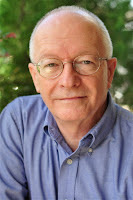 Henry’s debut novel, Journey to Riverbend, won the 2009 Operation First Novel contest.
Henry’s debut novel, Journey to Riverbend, won the 2009 Operation First Novel contest.Henry edits novels, leads critique groups, and teaches at conferences and workshops. He enjoys mentoring and coaching individual writers.
Connect with Henry on his BLOG, TWITTER and FACEBOOK.
Published on February 21, 2024 22:00
February 20, 2024
12 Helpful Life Hacks For Writers
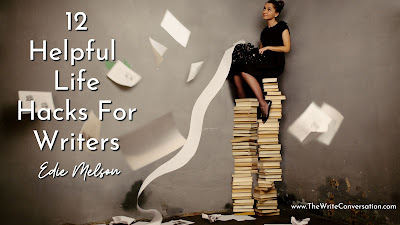
by Edie Melson @EdieMelson
The writer’s life isn’t an easy one. So much of what we create comes from some place deep inside ourselves. Giving that way can be exhausting, not to mention frustrating, when we feel empty.
The good news is that there are things we can do to help ourselves. I’ve come to learn that we either set ourselves up for success or we set ourselves up for failure. Today I’ll share some of the writing and blogging hacks that every successful writer needs to know.
Writing Life Hacks
1. Writing is a mind game—and our minds play tricks on us. When we’re in a good mood, we have confidence. When something goes wrong, that confidence melts away. Successful writers don’t base their confidence on emotions.
2. Speak kindly to yourself. Along with the attitude comes the way we treat ourselves. We talk junk to ourselves in ways that we would never talk to someone else. Decide right now to stop. Speak words of encouragement to yourself and you’ll speed the path to success.
3. Take care of yourself physically. Writing isn’t just hard because of the mind games. It’s hard on our bodies. Just sitting all day has shown to cause horrible health problems. Take time to get the exercise you need and fuel your body with healthy food and plenty of water.
4. Schedule some rest and relaxation. I’m not necessarily talking about napping, although that's not a bad idea. Writing regularly is important, but so is time away. Take a drive, plan lunch out with a friend, what ever helps you relax.
5. Follow a regular writing schedule. Notice I said regular—not normal. You may only be able to write late at night, or early in the morning. Or you may only be able to write on the weekends. Whatever works for you is fine—as long as you do it regularly.
6. Surround yourself with other writers who have the same commitment. This is so important. If you surround yourself with others who aren’t serious about writing or those you constantly have to shore up and encourage, you’ll wear yourself out. Find people who are committed to finish well, no matter what life problems crop up.
7. Set goals that you can track and measure. If you can’t tell how close you are to a goal, it’s pretty frustrating, so make sure the goals you have are ones where you can track the progress. For example, set a goal to send out so many queries or proposals or attend so many conferences. Don’t make getting a publishing contract the goal. You really don’t have any control over a publisher saying yes or no. BUT you can write the book, send out the queries and get everything in place for when it does happen.
8. Invest in your dream. You have the right to follow your heart. Don’t let anyone say you don’t. But also don’t be your own worst enemy. Invest time, effort and money in making your publishing goals a reality.
9. Learn how to take critique. Writers seem to range from one extreme to the other. We either think everything we write is perfect and better than anything out there. Or we think everything we write is junk. We have no perspective. Find others you respect and listen to what they have to say about your writing. Improve where you need to, and relish the parts that truly are great.
10. Read regularly. I know that none of us has the time, but successful writers (those who are growing in their craft) know it’s vital to take the time. Read regularly, read deeply and read widely.
11. Never go anywhere without a notebook. That notebook might be a note-taking app on your mobile device, but never be without a way to record idea. Inspiration ALWAYS strikes at inconvenient times. Don’t get caught without a way to capture an illusive idea.
12. Keep writing, no matter what. Yes, life happens. But no matter what rough time you’re going through keep writing. You might be able to put away the formal projects when a crisis hits, but keep writing something—a journal, a poem, a prayer.
These are the things that help me keep moving forward, no matter what. I’d love for you to add to the list.
Don’t forget to join the conversation!Blessings,Edie
TWEETABLE12 Helpful Life Hacks For Writers from @EdieMelson (CLick to Tweet)
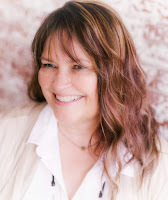 Edie Melson is a woman of faith with ink-stained fingers observing life through the lens of her camera. She’s learned to embrace the ultimate contradiction of being an organized creative. As an author, blogger, and speaker she’s encouraged and challenged audiences across the country and around the world. Her numerous books reflect her passion to help others develop the strength of their God-given gifts and apply them to their lives, often using creativity to empower this connection. The Write Conversation, the blog she developed and manages, reaches thousands and has been on the Writer’s Digest Top 101 Sites for Writers since 2017. As a social media and blogging expert she’s worked with clients that range from authors and speakers to business and ministry leaders. She also knows the necessity of Soul Care and leads retreats, conferences & workshops around the world on staying connected to God. Her numerous books, including the award-winning Soul Care series reflect her passion to help others develop the strength of their God-given gifts. She’s the director of the Blue Ridge Mountains Christian Writers Conference and board member of the Advanced Writers and Speakers Association.
Edie Melson is a woman of faith with ink-stained fingers observing life through the lens of her camera. She’s learned to embrace the ultimate contradiction of being an organized creative. As an author, blogger, and speaker she’s encouraged and challenged audiences across the country and around the world. Her numerous books reflect her passion to help others develop the strength of their God-given gifts and apply them to their lives, often using creativity to empower this connection. The Write Conversation, the blog she developed and manages, reaches thousands and has been on the Writer’s Digest Top 101 Sites for Writers since 2017. As a social media and blogging expert she’s worked with clients that range from authors and speakers to business and ministry leaders. She also knows the necessity of Soul Care and leads retreats, conferences & workshops around the world on staying connected to God. Her numerous books, including the award-winning Soul Care series reflect her passion to help others develop the strength of their God-given gifts. She’s the director of the Blue Ridge Mountains Christian Writers Conference and board member of the Advanced Writers and Speakers Association.She and husband Kirk have been married 42+ years, and live near their three sons and three grandchildren in the foothills of the Blue Ridge Mountains. Edie and Kirk can often be found with their big black dog hiking—Edie hanging off ledges for the best camera angle and Kirk patiently carrying her tripod. Connect with her on her website, www.EdieMelson.com and through social media.
Published on February 20, 2024 22:00
February 19, 2024
Five Steps that Will Help Writers Combat Imposter Syndrome

by Dr. Katherine Hutchinson-Hayes @KHutch0767
In middle school, I had my initial experience with performing in theatre. It was the first time I felt I could escape into my role as a cabaret singer. I was no longer the nerdy girl who wore skirts every day. Instead, I was part of a group of glamorous performers who presented Broadway vignettes. At times, I felt like a fraud, but our theatre directors insisted that we fully engage with becoming the characters we had been chosen to play. Although I struggled with feeling like an imposter, the more I allowed myself to escape into becoming the character I had been selected to represent, the easier my role became.
As Christian authors, many of us struggle with imposter syndrome, the same way I struggled to accept my role as a cabaret singer in middle school. Imposter syndrome for writers is the feeling that we’re not good enough and don’t belong in the writing community. This is a common problem many writers face, but it can be particularly challenging for those writing from a Christian perspective.
Five Steps to More Confident Writing By Combating Imposter Syndrome
Step 1: Remember our purpose
Christian authors’ writing has a purpose beyond telling a story or sharing our ideas. We have a message to share with the world; writing is a way to do that. When we feel like imposters, we need to remind ourselves of the purpose behind our writing. Focus on the message we want to share and the impact we hope to have on our readers.
Step 2: Recognize our strengths
We all have strengths and weaknesses and must recognize what we excel at. As writers, we may have a strong voice, a talent for storytelling, or a unique perspective on the world. Whatever our strengths are, embrace them and use them to our advantage. When feeling like imposters, remind ourselves of our strengths and how they make us valuable contributors to the writing community.
Step 3: Connect with other writers
Writing can be lonely, but it doesn't have to be. Reach out to other writers, both in the Christian community and beyond. Join writing groups, attend conferences, and participate in online communities. When we connect with other writers, we’ll realize that we’re not alone in our struggles and that everyone has their insecurities. We’ll also learn from others and gain new perspectives on the writing process.
Step 4: Practice self-care
Writing can be stressful, and taking care of ourselves is essential. Make sure we’re getting enough sleep, eating well, and taking breaks when we need them. Find activities that help us relax and recharge, whether walking, listening to music, or spending time with loved ones. When we’re feeling good physically and mentally, we’ll be better equipped to handle imposter syndrome and other challenges that come with writing.
Step 5: Keep writing
The best way to combat imposter syndrome is to keep writing. Write every day, even if it’s just for a few minutes. Celebrate our successes, no matter how small, and learn from our failures. Remember that every writer has doubts and insecurities, no matter how successful. The key is to keep writing, improving, and sharing our messages.
Imposter syndrome can be challenging for Christian writers but not impossible. By remembering our purpose, recognizing our strengths, connecting with other writers, practicing self-care, and writing, we can overcome imposter syndrome and feel confident in our writing.
TWEETABLEFive Steps that Will Help Writers Combat Imposter Syndrome from @KHutch 0767 on @EdieMelson (Click to Tweet)
 Dr. Katherine Hutchinson-Hayes is a review board member and contributor to Inkspirations (an online magazine for Christian writers), and her writing has been published in Guideposts. Her work in art/writing is distinguished by awards, including the New York Mayor’s Contribution to the Arts, Outstanding Resident Artist of Arizona, and the Foundations Awards at the Blue Ridge Mountains Christian Writer’s Conference (2016, 2019, 2021). She is a member of Word Weavers International and serves as an online chapter president and mentor. She belongs to FWA (Florida Writers Association), ACFW (American Christian Fiction Writers), CWoC (Crime Writers of Color),
Dr. Katherine Hutchinson-Hayes is a review board member and contributor to Inkspirations (an online magazine for Christian writers), and her writing has been published in Guideposts. Her work in art/writing is distinguished by awards, including the New York Mayor’s Contribution to the Arts, Outstanding Resident Artist of Arizona, and the Foundations Awards at the Blue Ridge Mountains Christian Writer’s Conference (2016, 2019, 2021). She is a member of Word Weavers International and serves as an online chapter president and mentor. She belongs to FWA (Florida Writers Association), ACFW (American Christian Fiction Writers), CWoC (Crime Writers of Color),AWSA (Advanced Writers and Speakers Association), and AASA (American Association of School Administrators). She serves on the nonprofit organization Submersion 14 board and the 540 Writer’s Community board and is an art instructor for the nonprofit organization Light for the Future. Katherine hosts the podcast Murder, Mystery & Mayhem Laced with Morality. She has authored a Christian Bible study for women and is currently working on the sequel to her first general market thriller novel. Her thriller A Fifth of the Story will debut in February 2024 through Endgame Press.
Katherine flourishes in developmental editing and coaching writers. She has a twenty-year career in education, leadership, and journalism. Katherine freelances as an educational consultant for charter schools, home school programs, and churches. In this role, she has written and edited curriculum, led program development, and helped manage growth facilitating and public relations.
She also works as an editor and book coach through her consulting business. Katherine provides skill, accountability, and professionalism so clients can begin, develop, and finish their writing projects for publication.
Published on February 19, 2024 22:00
February 18, 2024
Book Marketing with Short Videos and Clips
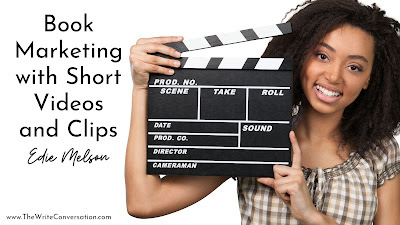
by Karen Whiting @KarenHWhiting
AI is making it easier to extract short video clips that can be great as reels of longer if desired. These can catch on fast and reach a larger audience than your longer videos, podcasts, and TV interviews you post. Instead of going through the long video and editing out clips, it is done in seconds. These can be thirty seconds to three minutes.
Creating Clips Using AI
Check out AI software that creates clips for free like vidyo.ai or try a free trial period with descript. It's easy to choose the video orientation for landscape or portrait or to choose a split screen when there are two people in the video.
In descript you can also edit videos and audio with the text itself. That makes it easier to cut out fillers like ums. Vidyo.ai will randomly create 8 short clips to the length you set and 5 chapters that may be up to five minutes. Each clip lists the running time in seconds, allows you to change the template used, and can generate the transcript to use that as a short blog post teaser, or
AI will also add the spoken words to the video and that's helpful on shorts. If you name your website page make sure it contains the correct spelling. This helps with social media that will not share the audio unless it is on a separate track.
Another way to create short clips is on Canva. You can use images with text and let it create the video, or add a voice over. You can also embed a short video clip in the video you are creating. These take minutes to make, especially if you let the AI within Canva come up with the images in the elements section. Simply describe the image needed and scroll through the graphics, photos, and short videos for what to use.
Posting Clips on Social Media
Laine Lawson Croft who produces the Warfare Parenting and Livin' Lively with Laine podcasts considers these among her most valuable tools. She can have vidyo.ai pull shorts from her podcast and that immediately gives her three posts to use for the week as stories on Facebook. The shorts greatly increased her viewer engagement. She uses cockatoo.com for transcription and pulls her blog posts off the transcription. She also pulled clips from her free video class and continues to repost those.
Once created it is easy to post the clips on Instagram, YouTube and other channels. Once it is on YouTube you can click share it and immediately add it to any social media you connected to YouTube.
Use the clip to bring people to the linger video. Add that in the comments on the platform so people who like the clip can watch the full video. In the comments add links to the book, your website, or other place to continue connecting to the viewer.
Marketing Focus
There are many ways to use the clips and they will go across many platforms. Video is still king so it's great to create these clips after interviews, workshops, and other videos you or someone else created with you in it.Let the clips be better than a calling card! Use these clips to create awareness, add to a PPT as an introduction or to showcase more about you. Engage with your audience with clips. Ask a question in the comments to start a conversation or invite them to subscribe to your newsletter.Promote the related book in the comment section with a few other reasons the book will meet their needs.
Types of Shorts to Create
Keep shorts to one minute or less. Make clips about contents of the book, something meaningful in your life your followers might enjoy such as your recent trip overseas, or a book trailer of an upcoming release or a short of you reading a few paragraphs from a book. You can also share about your writing life, why you wrote the book, workspace, or what you do when you need a break from writing to build a personal connection.
If like me, you have books that include crafts, cooking, or other visual elements, do videos about those too. That's when you may need the chapter/longer clips to post.
Call to Action
With the short or the comment section, ask viewers to sign up for something, review the book, link to a landing page, or buy the book or join the launch team. It's important to add those calls to action to motivate listeners to respond to the clips.
Shorts for ads
Short clips done well can make great ads too for FB, amazon, and other platforms. To be effective, make sure the first 10 seconds will grab attention. That's how long it takes for a viewer to decide to stop or continue watching.
We are still at the beginning of harnessing the power of AI in marketing but for those who don't like marketing, it really saves time and does a lot of work for you.
TWEETABLEBook Marketing with Short Videos and Clips from author @KarenHWhiting on @EdieMelson (Click to Tweet)
 Karen Whiting (WWW.KARENWHITING.COM) is an international speaker, former television host of Puppets on Parade, certified writing and marketing coach, and award-winning author of twenty-seven books for women, children, and families. Her newest book, The Gift of Bread: Recipes for the Heart and the Table reflects her passion for bread and growing up helping at her grandparent’s restaurant. Check out her newest book Growing a Mother’s Heart: Devotions of Faith, Hope, and Love from Mothers Past, Present, and Future. It's full of heartwarming and teary-eyed stories of moms.
Karen Whiting (WWW.KARENWHITING.COM) is an international speaker, former television host of Puppets on Parade, certified writing and marketing coach, and award-winning author of twenty-seven books for women, children, and families. Her newest book, The Gift of Bread: Recipes for the Heart and the Table reflects her passion for bread and growing up helping at her grandparent’s restaurant. Check out her newest book Growing a Mother’s Heart: Devotions of Faith, Hope, and Love from Mothers Past, Present, and Future. It's full of heartwarming and teary-eyed stories of moms.Karen has a heart to grow tomorrow’s wholesome families today. She has written more than eight hundred articles for more than sixty publications and loves to let creativity splash over the pages of what she writes. She writes for Crosswalk. Connect with Karen on Twitter @KarenHWhiting Pinterest KarenWhiting FB KarenHWhiting.
Published on February 18, 2024 22:00
February 17, 2024
How to Choose Your Classes at a Writing Conference

by Tammy Karasek @TickledPinkTam
Writing conference information has entered our social media feeds for 2024. There are so many to choose from, which is a good thing. With so many offered, there’s a better chance one will be close to where you live or offer what you are looking to learn about. Although, there are times that a little bit of travel to a conference that is larger or has more years of experience is worth the extra time and money to attend. Do the research on as many as you can, and don’t forget to reach out to those who may have attended before you.
You’ve picked the conference you want and have registered. Then you click on the list of classes you must pick to fill your schedule. Hold up a minute … here’s a tip for you from someone else’s experience—that would be me. When I attended my first large writing conference, the Blue Ridge Mountains Christian Writers Conference, I thought I had to fill in all the squares of classes and also the two extra classes for back-ups. And I tried to attend them all. Every. One. Of. Them. Hear me on this, you most certainly can attend all of them, but don’t pressure yourself to do that if you are the type of person who needs to go at a slow and steady pace. Some of us want every moment filled, others like to take in a couple of classes and the information from them, and then go somewhere quiet and process that information. Know your information download style.
But, how do we choose which classes to take? Some classes might be obvious and should be on the top of your list. If you are a fiction writer and eager to hone your craft of writing fiction, look for those first and mark them for ease to find later. Next go through and look for classes that will be necessary in the future, such as marketing classes or social media classes for you to gain insight on how to grow your audience reach.
However, before you skip over classes you may think aren’t for you, take a moment and read the description the class instructor has provided. For instance, one year I skipped over screenwriting because I didn’t have thoughts of doing that type of writing. Then to my surprise, a fellow fiction writer attended and shared how it was geared to teaching the fiction writer to write better description scenes in their novels for the reader to see the words you are writing.
To help you out as you prepare to attend a writing conference—any conference you choose to attend—here are some suggestions.
Top 5 Tips on Choosing Classes at a Writing Conference
1. Pray about what help you are seeking at this time for your writing. For fiction, are you struggling with story world, plotting, or dialogue—look for those classes. For nonfiction, maybe you want to write devotionals or self-help books that encourage and give people the tools to see God at work—watch for classes that take your nonfiction to the next level.
2. Do your best to look through the class offerings before you get to the conference if at all possible. Many conferences do post the class offerings. Create a blank schedule for yourself so you can plug in the classes you’d like to attend. I know the BRMCWC I spoke about above gives you a handy blank schedule for to download and use for your classes. Print out a couple copies and do a preliminary one before you go. As you meet the faculty on the first day as they are introduced at most conferences, make the decision between two classes you were unsure of which was a better fit for this year.
3. The night before your classes start at the conference, use one of those schedules you’ve downloaded or made on your own and make a new one for yourself. Also, put those #2 and #3 choices below the class you think you want. I have sat in a class and within the first minute, I realized it was either way over my head or I misunderstood what I read. I quietly got up and moved to the #2 choice on my schedule. Instructors are used to folks moving in and out of classes because of Agent/Editor appointments. Just be quick and quiet.
4. Be mindful of your energy level at learning so many new things at one time. I’m not kidding with this one. You will often hear at these conferences, that by the end of the week you will feel like you’ve been hit with a firehose of great information, but it came fast and lots of it. Build in a short coffee break—maybe even with a new writing friend.
5. Make sure you allow time to meet others in your classes. These may be your new writing buddies for years to come. They are also a great resource of asking about some of the classes you’ve chosen. Maybe they took the class before or have sat in that particular instructor’s class and share insight on their teaching style.
Whatever you do, make sure you take the time to go through the list of class selections and have a general guide to follow for your conference. They move fast and you will be glad you took some time to think through your schedule before you arrive.
How about any of you who have attended writing conferences before—can you offer more tips to help fellow writers make the most of their classes? Please share in the comments below and thanks for your help!
TWEETABLEHow to Choose Your Classes at a Writing Conference - @TickledPinkTam on @EdieMelson (Click to Tweet)
 Tammy Karasek uses humor and wit to bring joy and hope to every aspect in life. Her past, filled with bullying and criticism from family, drives her passion to encourage and inspire others and give them The Reason to smile. She’s gone from down and defeated to living a “Tickled Pink” life as she believes there’s always a giggle wanting to come out! A writer of Romance—with a splash of sass. She’s also The Launch Team Geek helping authors launch their books and also a Virtual Assistant for several best-selling authors. Don't miss her recent book, LAUNCH THAT BOOK, just released in November.
Tammy Karasek uses humor and wit to bring joy and hope to every aspect in life. Her past, filled with bullying and criticism from family, drives her passion to encourage and inspire others and give them The Reason to smile. She’s gone from down and defeated to living a “Tickled Pink” life as she believes there’s always a giggle wanting to come out! A writer of Romance—with a splash of sass. She’s also The Launch Team Geek helping authors launch their books and also a Virtual Assistant for several best-selling authors. Don't miss her recent book, LAUNCH THAT BOOK, just released in November. Her work was also published in a Divine Moments Compilation Book—Cool-inary Moments. She’s also the Social Media Manager for the Blue Ridge Mountains Christian Writers Conference, Founding President and current Vice-President of ACFW Upstate SC, and Founding President of Word Weavers Upstate SC. She’s a writing team member for The Write Conversation Blog, Novel Academy, MBT Monday Devotions, The Write Editing and more. Connect with Tammy at HTTPS://WWW.TAMMYKARASEK.COM.
Published on February 17, 2024 22:00
February 16, 2024
Discover the Joy of SINGLE-Tasking When You Write

by Edie Melson @EdieMelson
I don’t know about you, but my life just keeps getting busier and busier. And for most of two decades I’ve heard the phrase multi-task. I’ve taken courses and read blogs on how multi-tasking is what leaders do, why multi-tasking is the key to productivity, how to multi-task more effectively, and how to choose which things to multi-task—among just a few. Sometimes I feel like I’m being encouraged to multi-task, multi-tasking.
It’s exhausting.
Even more than that, I don’t think it has helped make my life better. All I feel is more exhausted.
In my opinion, multi-tasking is the invention of someone who want to set the civilized world on a path to permanent destruction. (I know, “Tell us what you really thing, Edie!”)
By the end of last year, I made a promise to myself. I would slow down and learn to enjoy life more. I wanted to be more in tune with the moment, instead of looking to my finished to-do list for satisfaction.
So I’m learning to embrace the joy of single-tasking, in all things and in all ways, including my writing.
What does it mean to single-task? Truthfully, I’m still discovering the depth and breadth of this endeavor.
Several Things I’ve Learned About Single-tasking
1. Single-tasking as a writer means I clear away distractions. I’ve cleared the clutter from my work space.I’ve turned off the internet. I’m forcing myself to close all the extra windows I’ve got open on my computer. Sometimes I even shut my computer, take out pen and paper and record my thoughts by writing.
2. Single-tasking means I take time to enjoy the process. I have a few things in my workspace that bring me joy and inspire me. A piece of art work done for me by a friendA framed photo my daddy tookMy favorite fountain pen and ink on displayI make my writing a priority by scheduling time in my day/week to write. Although I’ve done this for several years, this is a vital part of single-tasking. By putting it down in my calendar I’m telling myself and others that this is important. I explore new/favorite places to write. Sometimes that means sitting on my screened porch, listening to the birds while I pour words on the page. At other times, I enjoy a cup of coffee or tea in my favorite coffee shop while I work.
Single-tasking means I choose my projects with care. I’ve learned to say “yes” with careful prayer and consideration. I want to choose projects that I’m passionate about. Does this mean I only write certain topics? Not always. Being passionate about a project can mean the topic or the fact that I’m learning something new. I stopped agreeing to do things out of guilt.I stopped agreeing to do things out of necessity. Did you know that seeing a need doesn’t mean I’m obligated to meet that need? That truth was a huge burden-lifter. I stopped agreeing to do things out of my need to fulfill someone else’s expectations.
Single-tasking means I spend time filling up the creative well inside me. For me, the most important part of this means I spend daily time reading God’s Word and praying.I also spend time doing other creative things that inspire me. As many of you know, I’m also a professional landscape photographer. Getting out with my camera inspires me—photographically, as well as in my literary endeavors. I take time to enjoy the creativity of others. I read books from authors I loveI go to movies and playsI visit art galleries and gardensI even enjoy televisionI hike and enjoy new places
These are just some of the ways I’ve begun practicing the art of single-tasking as a writer. I’d love for you to share your thoughts and tips in the comments section below.
Don’t forget to join the conversation!Blessings, Edie
TWEETABLEDiscover the Joy of SINGLE-Tasking When You Write, @EdieMelson (Click to Tweet)
 Edie Melson is a woman of faith with ink-stained fingers observing life through the lens of her camera. She’s learned to embrace the ultimate contradiction of being an organized creative. As an author, blogger, and speaker she’s encouraged and challenged audiences across the country and around the world. Her numerous books reflect her passion to help others develop the strength of their God-given gifts and apply them to their lives, often using creativity to empower this connection. The Write Conversation, the blog she developed and manages, reaches thousands and has been on the Writer’s Digest Top 101 Sites for Writers since 2017. As a social media and blogging expert she’s worked with clients that range from authors and speakers to business and ministry leaders. She also knows the necessity of Soul Care and leads retreats, conferences & workshops around the world on staying connected to God. Her numerous books, including the award-winning Soul Care series reflect her passion to help others develop the strength of their God-given gifts. She’s the director of the Blue Ridge Mountains Christian Writers Conference and board member of the Advanced Writers and Speakers Association.
Edie Melson is a woman of faith with ink-stained fingers observing life through the lens of her camera. She’s learned to embrace the ultimate contradiction of being an organized creative. As an author, blogger, and speaker she’s encouraged and challenged audiences across the country and around the world. Her numerous books reflect her passion to help others develop the strength of their God-given gifts and apply them to their lives, often using creativity to empower this connection. The Write Conversation, the blog she developed and manages, reaches thousands and has been on the Writer’s Digest Top 101 Sites for Writers since 2017. As a social media and blogging expert she’s worked with clients that range from authors and speakers to business and ministry leaders. She also knows the necessity of Soul Care and leads retreats, conferences & workshops around the world on staying connected to God. Her numerous books, including the award-winning Soul Care series reflect her passion to help others develop the strength of their God-given gifts. She’s the director of the Blue Ridge Mountains Christian Writers Conference and board member of the Advanced Writers and Speakers Association.She and husband Kirk have been married 42+ years, and live near their three sons and three grandchildren in the foothills of the Blue Ridge Mountains. Edie and Kirk can often be found with their big black dog hiking—Edie hanging off ledges for the best camera angle and Kirk patiently carrying her tripod. Connect with her on her website, www.EdieMelson.com and through social media.
Published on February 16, 2024 22:00
February 15, 2024
What Part Does Divine Inspiration Play in Our Writing

by Crystal Bowman
Several decades ago, when my hubby and I began listening to contemporary Christian music (instead of oldies from the 60s), we enjoyed the music of Dallas Holm. Born in 1948, his musical ministry spanned nearly four decades. His 1977 live album (with the group Praise) featured his best-know song, “Rise Again,” a powerful song about the resurrection of Jesus. Before he sang the song, he spoke to the audience and his words have stuck with me. He said (paraphrasing according to my memory), “On most days, I write lyrics and music because that’s what I do—it’s my job and it’s the gift God has given me. But every once in a while, an idea for a song comes to me that I believe God has given me. This next song (Rise Again) is one of those songs.”
As a writer, I can relate to his experience. I have many days when I turn on my computer and just start tapping keys as words in my head appear on the screen. I might be in the middle of a manuscript, writing a blog article, or doing some self-editing, trying to meet a tight deadline. I write because it’s my job and it’s the gift God has given me. But every now and then, I have an idea for a story or article that I believe comes from divine inspiration.
God’s hand is in all my writing, and I pray for Him to guide my mind and words as I write. Whether it’s a picture book, devotion, or the comic page for Clubhouse Jr. magazine. I cannot write apart from Him. But I love those special “God moments” that trigger a divinely inspired idea that needs to be written. When the sun melted frost on my windshield in three spots spelling the word God (yes, that really happened), I wrote a devotion about Immanuel—God with us. When my neighbor asked why I leave all the lights on at night (inside and out), I told her I did no such thing. It later occurred to me that I pray for angels to surround my house at night, and that’s the light she sees. Another devotion came from that!A nearly impossible idea came to me that I never would have thought of with my blonde brain. I co-authored an alphabet Christmas picture book with my adult daughter. Why was it challenging? Because we told the entire Christmas story in chronological order using key words from A-Z. What I enjoyed the most was including Old Testament messianic prophecies that were fulfilled with the birth of Jesus. I had chills as the words came together to tell the miraculous Christmas story in a unique and original way.
In Conclusion
If God has given you the gift of writing, then use it! Do everything you can to become the best writer you can be. And when you have an idea that comes from above, turn on your computer and start tapping those keys. You may be surprised at what appears on your screen.
To God be the glory!
TWEETABLEWhat Part Does Divine Inspiration Play in Our Writing from author Crystal Bowman on @EdieMelson (Click to Tweet)
 Crystal Bowman is an award-winning, bestselling author of more than 100 books for children and families. She also writes lyrics for children’s piano music and is a monthly contributor to Clubhouse Jr. Magazine, Arise Daily, and Christian Children's Authors. She enjoys coaching children's writers as well as teaching at writers conferences. When she is not writing or speaking, she likes going for walks and spending time with her huggable grandkids. She and her husband live in Michigan and Florida and try to avoid snowstorms.
Crystal Bowman is an award-winning, bestselling author of more than 100 books for children and families. She also writes lyrics for children’s piano music and is a monthly contributor to Clubhouse Jr. Magazine, Arise Daily, and Christian Children's Authors. She enjoys coaching children's writers as well as teaching at writers conferences. When she is not writing or speaking, she likes going for walks and spending time with her huggable grandkids. She and her husband live in Michigan and Florida and try to avoid snowstorms.WWW.CRYSTALBOWMAN.COMWWW.FACEBOOK.COM/CRYSTAL.BOWMANWWW.FACEBOOK.COM/CRYSTALJBOWMANWWW.INSTAGRAM.COM/CRYSTALBOWMANAUTHOR
Published on February 15, 2024 22:00
February 14, 2024
Writers Conference 1101: Ten Tips to Maximize Your Return

by Lilka Raphael @Lilka_Raphael
Conference season is upon us. Investing in writing conferences is by far the smartest thing I have done to refine my writing. Publishing trends and challenges evolve. Appointments with editors, informative classes, and connecting with other writers yield an invaluable return on the time and money spent attending.
Here are my top ten tips to make the most of any writing conference.
1. Choose wisely. I attended a large conference for years. Though I learned much, I would be farther along in my writing career if I had first researched various conferences. The editors and agents interested in the devotions I write are most likely attending a Christian conference rather than a broader one soliciting the next thriller or sci-fi fantasy. There are conferences available for practically every genre. Select a conference that has editors, publishers, and classes that specialize in what you write.
2. Dress the part. Most conferences encourage comfort. However, a tidy appearance demonstrates that you value the time of the people you meet. You can even dress in a theme if it ties into the project you are pitching. But don’t be outlandish. You want recognition for all the right reasons.
3. Invest in business cards. This goes back to recognition. Your business cards don’t have to be expensive. Your name, photo, and email will suffice. If you have a novel to promote or accolades to note, add those as well. But keep it simple. The card should be easy to read and uncluttered.
4. Enter a contest. Most conferences will have at least one. The deadlines are usually a month or more prior to the conference. Writing to compete made me scrutinize word choices I would otherwise overlook. It also forced me to work toward a deadline. This straightforward exercise can generate valuable feedback. Recognition for your work will also motivate you to write more.
5. Pay for a critique or mentoring. For the price of dinner, you can gain access to a professional. If you have an appointment, do your research. Not only will you feel prepared, but you may identify important questions to ask. Pinpoint professionals that work with your genre. You can find their preferences on their individual sites. Do not pitch your historical thriller to someone seeking nonfiction unless requested to do so. The advice and continued mentoring I have received was well worth the nominal fees.
6. Take the pressure off. It is possible to walk away from a conference with a book contract, but it is highly unlikely. Instead, prioritize the classes and meeting people. Make note of any comments or ideas that you can apply in your work. Conferences should be educational and enjoyable. Allow time to laugh and relax.
7. Mingle. The best advice I received at my last conference came from a seasoned devotional writer. She suggested that I meet as many professionals as possible. You may not have lunch with the rock star agent everyone is anxious to pitch. However, you can learn a great deal from publishers and agents with available appointments and extensive knowledge. I have found that they are eager to help new authors. Networking might allow you to supersede a backlog of submissions and get your work in front of a publisher. You can never anticipate how these connections will benefit you later. A conference is a safe environment to meet people in the industry.
8. Pace yourself. My favorite conference is also the largest one I attend. The opportunities are endless. However, I manage my activities, so I’m not overwhelmed. Carefully, select the classes and speakers that will benefit you. Do not overschedule. Exercising restraint allows you to leave the conference revitalized instead of exhausted.
9. Be yourself. You don’t have to emulate a best-selling author to succeed. If you start off exuberant but you are actually laid back, it will prove impossible to maintain that façade. Industry professionals want to meet your authentic self. Your words are valuable and so are you.
10. Give thanks. Words of gratitude are rare even among writers. One publisher continued to mentor me long after the conference was over. Acknowledging their time and comments may help you develop a professional relationship. Writing is a solitary endeavor, yet it takes a village to get our words out among the masses. Gratitude goes a long way toward building a community that we can learn from and contribute to in return.If you cannot attend a conference this year, prepare now for 2025. Identify the conferences that provide the best opportunities for your genre. In the interim, take a class or attend a workshop. Consider entering an online contest or two. We should continually strive to hone our skills. The best investments we can make to improve our writing is investing in ourselves.
TWEETABLEWriters Conference 1101: Ten Tips to Maximize Your Return from @Lilka_Raphael on @EdieMelson (Click to Tweet)
 A Florida native, Lilka Finley Raphael has been a licensed pharmacist for over thirty years. Her passions for writing, gardening, and photography prompted her to share her experiences and life lessons on her blogs B Is for Blessed and God, autism, & me. You can learn more about her at lilkaraphael.com
A Florida native, Lilka Finley Raphael has been a licensed pharmacist for over thirty years. Her passions for writing, gardening, and photography prompted her to share her experiences and life lessons on her blogs B Is for Blessed and God, autism, & me. You can learn more about her at lilkaraphael.comLilka’s greatest achievements are her two adult sons who have flown the nest. Happily married for thirty-two years, she lives east of Atlanta with her husband, Rod. They now share their home with two German Shepherds—Holly and Ivy—and one naughty kitty, Moxie.
Published on February 14, 2024 22:00



